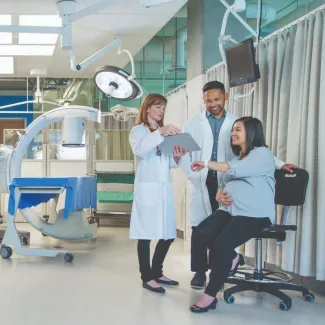Spotlight: Program Series with Cheryl Segaric - Clinical Education

By Cheryl Segaric, former program director of the MHLP in Clinical Education
Health care is in a constant state of flux and development – from the changes emerging with access to ever-increasing amounts of data to the introduction of new initiatives, technologies and care strategies. Health-care practitioners need to stay up to date with the latest developments to meet practice and accreditation standards, and clinical education plays a crucial role in ensuring that happens.
The Master of Health Leadership and Policy (MHLP) in Clinical Education program was developed out of an understanding that there is a real need for leaders who are well-versed in best practices in clinical education and equally comfortable with data collection and analysis, business strategy and project management. Consider, for example, the complexity of moving from a paper-based patient record system to electronic records. A large-scale initiative like this requires leaders with a wide range of management and people skills. Leaders need to obtain buy-in from multiple stakeholders and develop a program that aligns with system-wide goals and is delivered efficiently to diverse user groups in a multiplicity of practice settings. This is an example of a particularly ambitious initiative, but it underlines the need for people who can combine a big-picture vision with the practical ability to lead change within practice settings.
To that end, 40% of the MHLP program is made up of classes that focus on business and leadership concepts. These classes on analytics, project management, strategic planning and organizational leadership are offered through UBC Sauder's Robert H. Lee Graduate School. They are complemented by courses taught through the Faculty of Applied Science that focus on the knowledge clinical educators need to implement best practices in curriculum development and learning strategies. Students learn how to design evidence-informed programs that are meaningful and relevant for different contexts and learning outcomes.
I teach a class that enables students to work in small groups to identify a clinical practice need and then design a hypothetical curriculum in response. This project requires students to draw on both their professional experience and the knowledge they’ve developed in the project management and organizational leadership classes through Sauder. Their work shows students’ deepening perspectives on the importance of strategic visioning and engaging with stakeholders, as well as their growing understanding of themselves and their specific teaching and learning, and leadership styles. Of course, the role of the clinical educator does not stop at development and implementation. Ongoing evaluation and revision are equally important.
Throughout our program, students explore ways to measure success and the impact of clinical education programs on practitioners and patients. The MHLP in Clinical Education also addresses a need within post-secondary institutions and pre-licensure education. There is a significant national shortage of educators equipped to teach future nursing students. For professionals who are considering a career track in the education stream, the MHLP in Clinical Education provides a solid grounding in the theory and practice of curriculum design and implementation.
Learn more about how the MHLP can help you lead change in your industry, giving you the technical knowledge, foundational business skills and leadership confidence to excel in your career.



